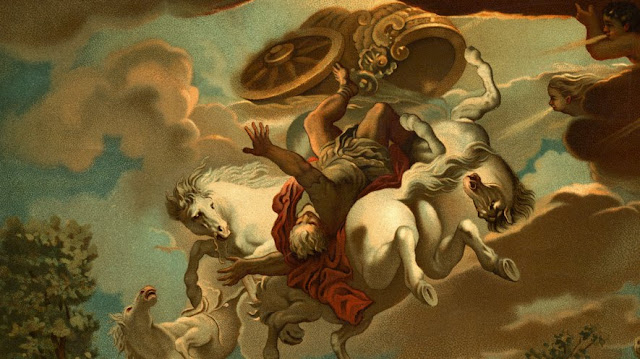Tantalus was a son of Zeus, and he had been so favored by the gods that he had been invited to feast with them on high Olympus. In return, he had asked the gods to come to dine in his palace in Asia Minor. He was a king of vast riches, but nothing he owned seemed good enough to set before his exalted guests. His son, Pelops, was his greatest treasure, and, wanting to give the gods his best, Tantalus decided to sacrifice him. He made a stew of him and set the dish before the gods. But the Olympian gods detested human sacrifice. Outraged, they threw Tantalus to the punishing grounds in the underworld and brought Pelops back to life. But one of his shoulder bones was missing, and the gods replaced it with a piece of ivory. They all gave him rich gifts. Poseidon gave him a team of fast horses and told him to set off and win himself a new kingdom.
In Greece there was a beautiful princess whose name was Hippodamia. She was the daughter of Oenomaiis, the King of Elis, and whoever married her would inherit his kingdom, but her father loved her so dearly that he could not bear to part with her. He had a team of horses given to him by Ares, the god of war, whose son he was, and whenever a suitor came to ask for his daughter's hand, Oenomaiis challenged him to a chariot race. If the suitor won, he would win the princess; if he lost, he would lose his head. No horses on earth could outrun the horses of Ares, and the heads of twelve suitors already hung at the gates of the palace.
When Pelops arrived in Elis to woo the princess, Oenomaiis did not know that Pelops also had a team of magic horses, and the King looked forward to nailing the thirteenth head on the gates! But Hippodamia fell in love with the young prince and wanted to save his life. She asked her
father's stable boy to fix the king's chariot so that Pelops would win. The stable boy, eager to please her, did more than he was asked to do. He took out the wooden pins that held the wheels to the axle, and replaced them with pins of wax.
Never had there been such a race! The fiery horses ran neck to neck, and the king, to his surprise, could not pull ahead, no matter how hard he swung the whip. Then suddenly the wax pins gave way. The wheels of the chariot flew off and the king was thrown to his death.
Pelops married Hippodamia and became the King of Elis. He flung the faithless stable boy into the sea, and gave the old king a magnificent funeral feast inviting heroes from all over Greece to take part in athletic games in his honor and offered fabulous prizes to the winners, for Pelops had brought with him the great riches of his father, Tantalus. The games were held on the plain of Olympia, in Elis, and were to be repeated every four years. They were called the Olympic games.


Comments
Post a Comment